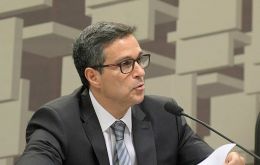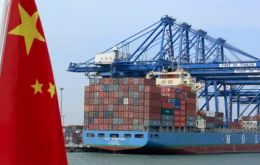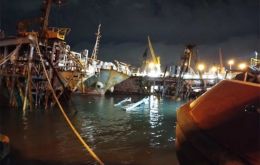MercoPress. South Atlantic News Agency
Economy
-
Sunday, December 11th 2022 - 08:30 UTC
Brazilian central bank keeps Selic rate at 13,75%; anticipates hawkish approach to combat future inflation

The Brazilian central bank maintained the benchmark Selic at 13.75% for a third consecutive meeting this week, as expected by all analysts. It was the last rate meeting before Lula da Silva assumes the country’s presidency on January first.
-
Sunday, December 11th 2022 - 08:09 UTC
China's lockdown policy and global slower demand reflect strongly in foreign trade

Chinese exports fell at the steepest pace in more than two years in November, the latest indication of how COVID-19 restrictions and slumping global demand are stifling the economy.
-
Sunday, December 11th 2022 - 07:59 UTC
Venezuela's minimum monthly wage back below US$ 10

Venezuela's Bolivar fell 17% against the US dollar from less than a week ago, leaving minimum monthly pensions and wages at around US$ 9.20, it was reported in Caracas Friday. Set at 130 bolivars in March, incomes went down 69% this year.
-
Friday, December 9th 2022 - 09:51 UTC
Ships sink in Montevideo Port dock collapse

A floating dock of the Tsakos shipping company in the port of Montevideo, where five ships were under repair, collapsed and two cranes fell into the water Thursday, leading to the partial sinking of three vessels, it was reported.
-
Friday, December 9th 2022 - 08:24 UTC
Egypt joins BRICS' New Development Bank

The government of Egypt announced this week that the country was joining the New Development Bank created by the BRICS bloc.
-
Wednesday, December 7th 2022 - 12:26 UTC
Cheaper gasoline and diesel fuel prices in Brazil

Brazil's oil and gas giant Petrobras started implementing a reduction in fuel prices at its refineries gates, effective this week. Gasoline price with being reduced 6,1% from R$ 3,28 to R$ 3,08, while A diesel on average will be dropping from R$ 4,89 to R$ 4,49, equivalent to an 8,2% rebate.
-
Wednesday, December 7th 2022 - 10:45 UTC
Slight drop in Uruguayan inflation reported through new measurement

Uruguay's inflation for the month of November of 2022 showed a -0.28% variation according to the National Institute of Statistics (INE) report released Monday. With these data, the accumulated CPI increase for the year reached 8.57% and 8.46% interannually (in the last 12 months).
-
Tuesday, December 6th 2022 - 10:50 UTC
Argentina to take over Mercosur's pro-tempore presidency amid Uruguay's solo deals

Argentina is to take over Tuesday the pro-tempore presidency of Mercosur from Uruguay in Montevideo, where the hosts' unilateral search for other markets behind the regional bloc's back has stirred controversies.
-
Tuesday, December 6th 2022 - 10:03 UTC
Argentina signs deal with US regarding undeclared taxpayers' assets

Argentina's Superminister of Economy, Industry, and Agriculture Sergio Massa Monday signed an agreement with US Ambassador Marc Stanley for the automatic exchange between the two countries of information about undeclared assets owned by local taxpayers.
-
Tuesday, December 6th 2022 - 09:48 UTC
Brazil's Central Bank adjusts 2022 inflation projections by 0.01%

Brazil's yearly inflation has been projected to reach 5.92% by the end of 2022, a 0.01% increase from last week's estimates, according to the Central Bank's (BCB) bulletin released Monday, while the Gross Domestic Product is expected to close at 3.05%.
